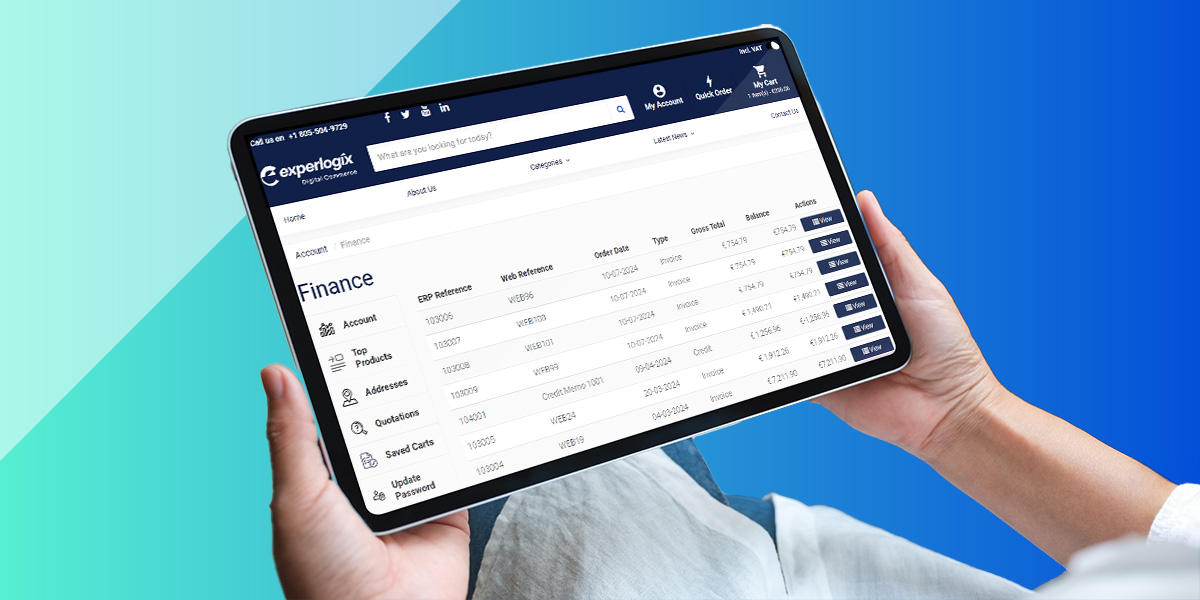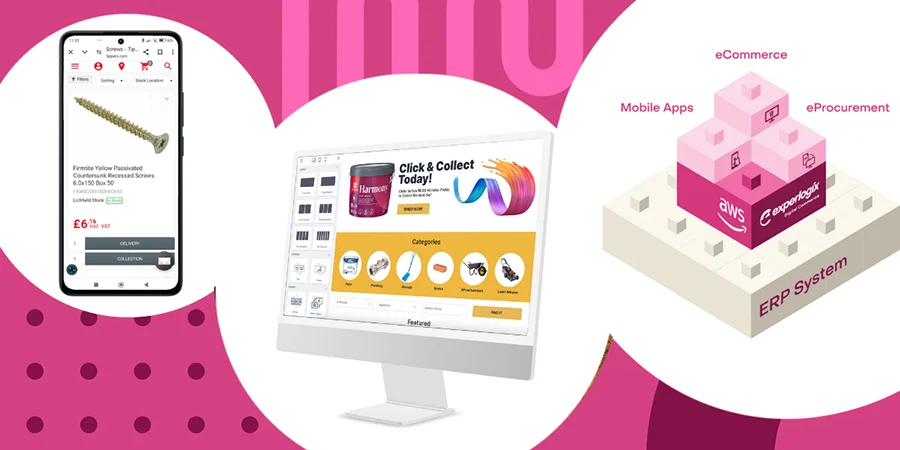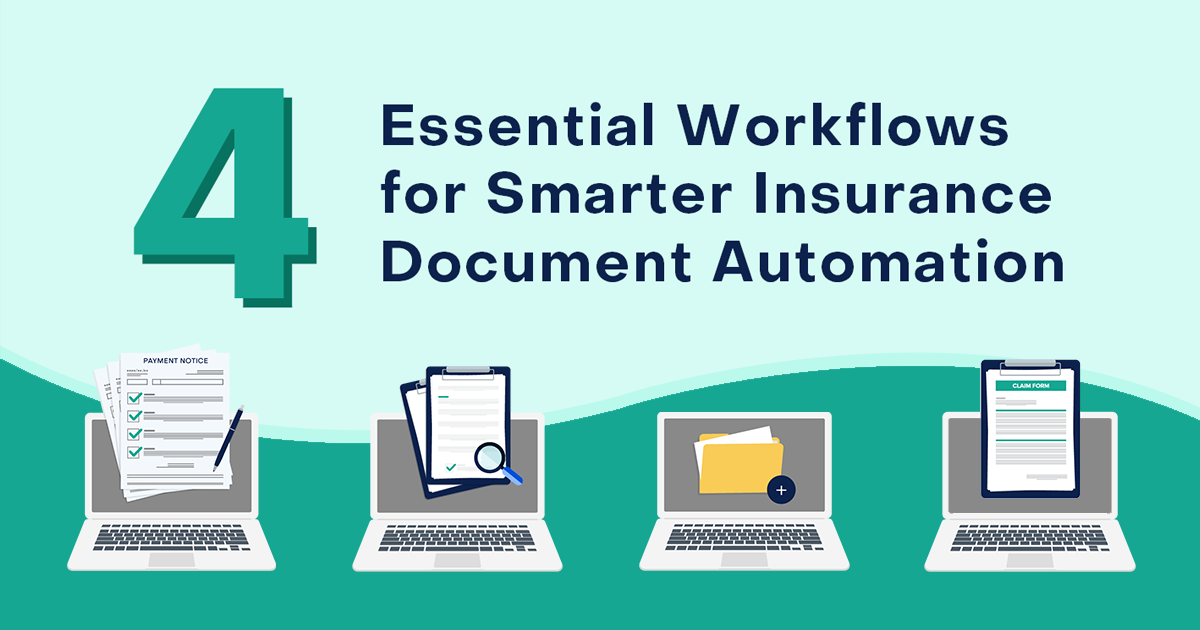Modern businesses face increasing pressure to streamline operations, enhance customer experiences, and maintain a competitive edge. One proven way to achieve these goals is to integrate ecommerce platforms with Enterprise Resource Planning (ERP) software.
Once you achieve this ecommerce integration, your team will become more efficient, better serve customers, save money, increase revenue growth, and more.
In this article, we dive into the many benefits of ecommerce and ERP integration, highlighting how this technological synergy can transform business operations and drive success.

What’s an Ecommerce and ERP Integration?
To understand the term “ecommerce-ERP integration” we need to break it down:
Ecommerce, often stylized as e-commerce, is the buying and selling of goods and services via the internet. This industry is expected to reach $47.23 trillion by 2030.
ERP stands for enterprise resource planning, and refers to a specific kind of software platform that helps companies complete daily activities, like accounting and supply chain management.
So, ecommerce-ERP integration is the connection between an ecommerce platform and an ERP system. This connection is wildly beneficial. Let’s talk more about that…
The 7 Benefits of a Good Ecommerce and ERP Integration
A solid ERP-ecommerce integration will help your company in multiple ways. Once you set up the connection, you’ll enjoy more efficiency, data accuracy, customer satisfaction, and more.
Let’s take a look at each of the seven main benefits in greater detail:
1. Improved Efficiency
The integration of your ecommerce platform and your ERP system will help you automate various business processes. Many things, from order processing to inventory management to financial reporting, can be automated, which will reduce manual work for your team.
For example, when a customer places an order on your ecommerce site, your ERP system can be programmed to automatically update inventory levels, generate an invoice, and schedule shipment—all without human involvement. This seamless flow of information minimizes errors, saves time, and allows employees to focus on more strategic tasks.
In addition, a strong ecommerc and ERP integration will make sure every department in your business is on the same page. How so? Data from your ecommerce platform will flow directly into your ERP software, which will eliminate data silos and create a single source of truth. When this happens, your sales, finance, inventory, and service teams will have real-time access to critical details.
Note: this benefit applies to companies that use customer relationship management (CRM) software in lieu of, or in addition to, their ERP of choice. Either way, efficiency levels go up.
2. Enhanced Data Accuracy
Integrating your ecommerce and ERP systems will help with real-time data synchronization too.
This feature syncs the changes you make in your ecommerce platform—like product updates, pricing adjustments, customer information—with your ERP solution, and vice versa.
Synchronization will dramatically reduce the risk of data discrepancies, which can lead to employee errors and delays, customer dissatisfaction, and other costly mistakes.
Speaking of employee errors, an integrated ecommerce platform will reduce them for your company. It makes sense. Your team won’t have as many chances to mess up when they don’t have to manually transfer data between your ecommerce and ERP solutions.
Imagine how much better off your ecommerce business will be when orders, customer details, and inventory levels are accurately recorded. So. Much. Better. Off.
3. Enhanced Customer Satisfaction
Successful companies create happy customers. This is hard to do without a strong ecommerce-ERP integration. After all, this connection improves efficiency and data accuracy.
Your customers want the products they order as quickly as possible. With integrated systems, your business can process orders accurately and in less time. You can also monitor delivery schedules and share the data with customers. Both of these things increase satisfaction.
But it gets better! ERP software stores customer data, which can be leveraged to create personalized shopping experiences. By integrating this data with your ecommerce platform, you can offer tailored product recommendations and individualized customer service.
At the end of the day, satisfied customers are more likely to return and recommend your products to their social circles. As such, they’re essential to your company’s long-term growth.
4. Enhanced Inventory Management
It’s not the most exciting topic in the world. But effective inventory management is critical to the success of your ecommerce brand because it prevents stockouts and overstock situations.
The right ERP ecommerce integration will make sure your inventory levels are automatically updated across all sales channels. This real-time visibility will help your business reduce carrying costs, while minimizing the risk of lost sales due to stockouts. Win!
Also worth a mention, most ERP systems include advanced analytics and forecasting tools. When integrated with ecommerce data, these tools provide insights into customer buying patterns and seasonal trends, which will enable you to make better inventory decisions.
5. Better Financial Management
Team efficiency, customer satisfaction, and inventory management are important—but only if they lead to additional profit. Fortunately, integrating ERP with ecommerce can help.
This integration streamlines financial reporting by consolidating data from multiple sources. The result? A comprehensive view of your company’s financial health. Armed with this information, you’ll be able to make better decisions regarding marketing and sales, and increase revenue.
Just as important, you’ll increase cash flow. Once you have real-time insight into sales, receivables, and payables, you can manage company funds more effectively. For example, you’ll be able to optimize payment schedules and reduce outstanding invoices without hassle.
As an added bonus, integration makes automation imminently possible. Since automated financial processes reduce errors and ensure regulatory compliance, this is a major benefit.
6. Scalability and Growth
Let’s talk about growth!
If you’re looking to enter new markets and expand your business, integrated ecommerce and ERP systems offer a scalable solution. This is true for one simple reason:
The integration will be able to handle increased order volumes, new product lines, and additional sales channels without requiring added human effort. In other words, you’ll be able to scale operations in a reliable way that allows you to reach your expansion goals.
Integrating your ERP and ecommerce systems will also make your company more agile. You’ll be able to adapt to changing market conditions, customer preferences, and alternate business requirements. You’ll be able to launch new products with more success too, which is often crucial to business growth. All in all, integration is key to your company’s future success.
7. Cost Savings
Last but not least, a smart ecommerce-ERP integration will save you money.
As discussed earlier, this integration allows for automation, which will improve team efficiency. After all, manual data entry, order processing, and inventory management require a significant amount of time. Automating them will allow your staff to focus on other value-added activities.
There are IT costs to think about as well. Maintaining separate ecommerce and ERP systems is rarely a good idea, as this approach is often resource-intensive. Integration reduces the need for multiple tools, which lowers IT infrastructure and maintenance costs. Plus, a unified system minimizes the risk of system downtime. Nothing kills ecommerce sales like a website outage.
Sell More With the Experlogix Ecommerce Platform
Looking to jump on the ecommerce bandwagon and make more sales? Experlogix can help!
Our platform was specifically designed to integrate with the top ERP solutions on the market, including SAP, Dynamics 365, and Sage. Once the connection is complete, you’ll enjoy automation for a variety of business tasks, features to improve the customer experience, and the ability to merge online and offline shopping journeys across multiple touchpoints.
Experlogix is also SaaS-based, which means you won’t have to allocate a portion of your budget to infrastructure, maintenance, and software development.
Put all of these things together and you’ve got an ecommerce tool that will increase revenue for your company today and tomorrow, as your company scales. Schedule a call with our team now to learn more about Experlogix Digital Commerce and how it can supercharge your sales.
Connect Your Ecommerce Platform to Your ERP System
As we’ve just seen, the integration of ecommerce platforms with ERP systems offers numerous benefits to ecommerce companies. In fact, it can significantly enhance business operations for your business, leading to improved efficiency, data accuracy, customer happiness, and profits.
The truth is, brands that leverage the synergies between ecommerce and ERP systems are better positioned to compete in today’s dynamic marketplace and achieve long-term growth.
So, what are you waiting for? Embrace this technological integration to streamline your workflows, deliver exceptional customer experiences, and stay ahead of the competition!








